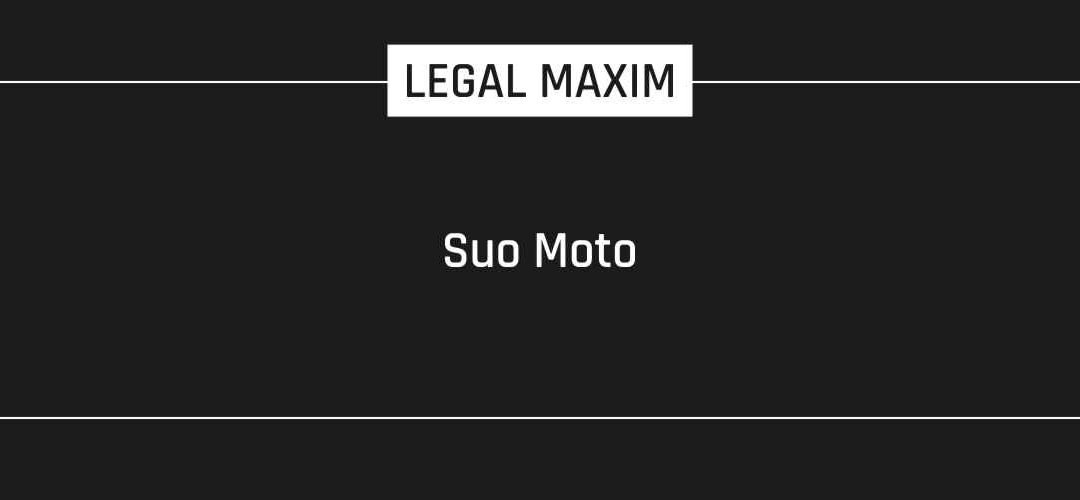Literal Meaning
On its own motion
Origin
Latin
Suo Moto has its genesis in the concept of “Epistolary Jurisdiction”, which emerged in the late seventies through judicial activism in order to make the judicial process more accessible to poor, socially and economically disadvantaged sections of the Society.
Explanation
Suo Moto is a Latin term which means an action taken by a government agency, court or other central authority on their own apprehension. In simple terms, it means taking control over a matter. Suo Moto cognizance is when the courts take a case on their own, in cases of gross negligence on part of public authorities or government or whenever the court deems fit. A court takes a Suo Moto Cognizance of a legal matter when it receives information about the violation of rights or breach of duty through media or a third party’s notification. The judge shall pass orders on matters of public interest in his own accord, without being approached by any party regarding the matter.
In India, suo moto has been warranted under Article 32 and Article 226 of the Constitution, which gives special power to the Supreme Court and High Court to issue any directions to do or refrain to do an act. In other words, when a court feels that a matter requires serious and immediate legal intervention, it acts Suo Motu. Supreme Court has been granted with suo moto power Article 131 of the Indian Constitution.
Further, in India, Suo Moto cognizance was taken up by the courts in the following instances:
Contempt of Court: The courts may initiate Suo Moto contempt against an officer who prevents the delivery of justice or challenges the dignity of the court by means disobedience towards the court and ignorance of rules and regulations, code of conduct, and ethics followed in a court.
Reopen Old Cases: Even if a case has been close and someone brings to the notice that some new and substantial evidence is discovered, the courts have the power to take Suo Moto action and reopen the case to try it again.
Order probe for a New Case: If any court is of the opinion that some injustice is being done to an aggrieved person or a section of people, the court can order probe at any level by any government authority, the police department, the CBI, etc. The court may also take such action after receiving a letter from the affected section of people or on the basis of any news, documentary, or media source.
Illustration
A files a case against B (a hospital) of not admitting an accident patient who later died due to his injuries. In such a case, a petition is filed by A against B in the court of law, in order to initiate the proceedings.
However, if a court is enlightened by a news report or by any other third party sources, wherein a hospital has been exposed for its illegitimate practice of extorting money before admitting patients who require urgent treatment, then the court may take suo moto action, which is an action taken on its own against the accused hospital. In such a case, the court shall appoint an amicus curiae to assist it in the matter.
Case Laws
Taking suo motu cognizance of the issue relating to the expeditious trial of cases under Section 138 of Negotiable Instruments Act 1881, the Supreme Court has recently issued notice to the Union of India through Law Secretary, Registrar General of all the High Courts, the Director-General of Police of all the States and Union Territories, Member Secretary of the National Legal Services Authority, Reserve Bank of India and Indian Bank Association, Mumbai as the representatives of Banking institutions.
The National Human Rights Commission, NHRC, India has taken suo motu cognizance of media reports that in Muzaffarpur district of Bihar, a person tried to outrage the modesty of a woman and when he was not successful, he poured kerosene on her and put her on fire. The Commission has observed that the contents of the news reports, if true, amount to serious violation of the human rights of the victim. Accordingly, it has issued notices to the Chief Secretary and the Director-General of Police, Bihar calling for a detailed report in the matter within four weeks.
The National Human Rights Commission, NHRC has taken suo motu cognizance of a media report that as many as 20 persons including the Civic Agency staff and the lawyers received head injuries in the alleged police action in Howrah, West Bengal on 24 April 2019. Reportedly, demanding action against the police personnel, the Bar Council of West Bengal observed black day throughout the State today and has resolved to cease the work till 29 April, in solidarity with the lawyers of Howrah.

Is suo moto part of procedural law? Does the parliament make suo moto?
Yes suo motor is a procedural law and parliament can make it because they makes decisions that are of public interest in the house which is most of their responsibilities .most laws the make is of public interest and it is obeyed by the society And failure to do that fellow the purishment for the offence
if the case is not maintainable case the court takes suo moto on the case?